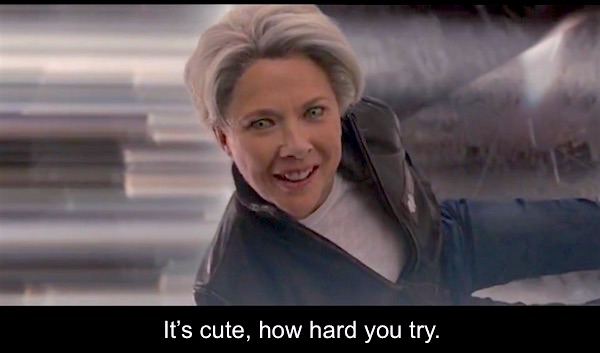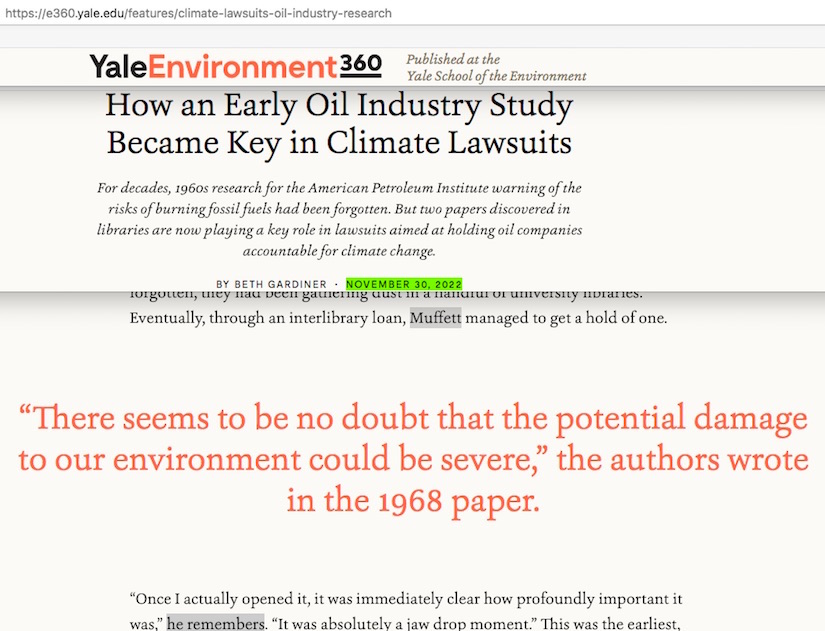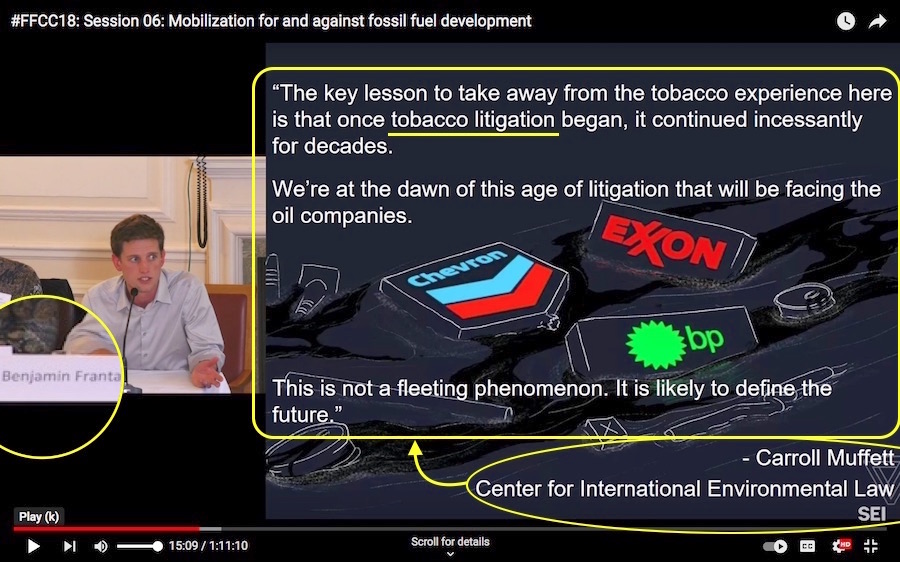One of the things the political far-left does, including enviro-activists, is seemingly make assertions that they have no hopes of supporting while crossing their fingers that nobody ever questions them about those assertions (which seems to be backfiring of late in an epic way on a non-environmental topic). Additionally, with regard to global warming activists, they seem to have literally no self awareness of how ironic their clamoring is about guilt-by-association tainting the credibility of the people they criticize, compared to their own hugely troublesome associations. It’s almost endearing, the way they valiantly attempt to keep their beloved issue alive in the face of potentially deep investigations which could expose their fatally crippled thought processes and their troubling associations.

I have my fun with using famous movie lines to illustrate my analysis points. One from Annette Benning’s character in the 2019 “Captain Marvel” movie applies to an article topic a prominent climate figure alerted me to.
It’s Yale360’s November 30, 2022 “How an Early Oil Industry Study Became Key in Climate Lawsuits,” in which the overarching premise is that, well, “Exxon Knew,” to use a trendy social media hashtag label. Meaning that the fossil fuel industry knew their products were harmful because they sent the climate into ever-warmer conditions. In this article’s story angle variant concerning “a 1968 paper commissioned by the American Petroleum Institute” (API – that API) and a person who supposedly realized the enormity of a ‘big truth’ in that old industry document, the article telegraphs the “Exxon Knew” talking point no later then its big call-out quote following the two introductory paragraphs, where the quote itself is just two paragraphs farther along:

… The paper’s delivery date put it well before Exxon’s extensive 1970s research into climate risks. … the decades-old paper explained that the world’s use of fossil fuels was releasing carbon that had been buried for millennia, and “it is likely that noticeable increases in temperature could occur,” if that burning continued. That would mean warming oceans, melting ice caps, and sea levels that could rise by as much as four feet per decade, the report predicted. “There seems to be no doubt that the potential damage to our environment could be severe,” the authors concluded. “The prospect for the future must be of serious concern.”
Typical of so many of these kinds of articles about allegedly damaging sentences within industry memos, this one does not let its reader examine the sentence within the document in its full context. Give the article credit for noting that the researcher hero of the story had “published excerpts” of the 1968 paper years earlier with a link to those hard-to-read 5 page ‘excerpts.’ What do we see at the bottom of his page 3 excerpt that he doesn’t highlight?
…. An increase in fine particular matter will have the effect of increasing the reflectivity of the earth’s atmosphere and reducing the amount of radiation received from the sun. Thus this effect wold be the oppose that caused an increase in CO2. The argument has been made that the large-scale cooling trend observed in the northern hemisphere since about 1955 is due to the disturbance of the radiation balance by fine particles and that this effect has already reversed any warming trend due to CO2.
What do we see at the bottom of the page 4 excerpt that he also doesn’t highlight, immediately after his highlighted “no doubt that the potential damage to our environment” line?
Whether one chooses the CO2 warming theory as described in detail by Revelle and others or the newer cooling prospect indicated by McCormick and Ludwig, the prospect for the future must be of serious concern.
Clearly, the authors of this old 1968 paper did not know in the least with any obvious certainty that the planet was warming or cooling from the burning of fossil fuels.
See what just happened? If the Yale360 article author had simply taken the time to look into the “published excerpts” she cites, then she would have realized she had a massive problem on her hands with the “Exxon Knew / American Petroleum Institute Knew” premise that’s the entire basis of her article. Had she taken the time to look into newspaper reports from the 1960s, she would have seen how concerns about runaway global cooling were all the rage back then (Cooling. Cooling!). Had she looked into the actual “Exxon Knew” documents she mentions that are within the 2015 exposé by Inside Climate News, she would have discovered in short order – as I discovered back when the Inside Climate News story came out – that Exxon didn’t seem to know jack whether models were predicting catastrophic climate problems or not. Had she taken the time to look into Dr Roger Revelle’s last co-authored work, she would have discovered that he basically recanted his prior position on CO2 causing runaway global warming.
Had she done all that, she would have realized that she had no article to write because lines within the 1968 report and other material undercuts the entire article. Had she looked deeper into the “star researcher” prominently featured right at the top of her piece and prominently throughout – the one who supposedly comprehended how the “American Petroleum Institute Knew,” then via tough questions posed to him and the other ‘citation source’ for her article, she might have realized that she had a whole different story on her hands.
I’m speaking first of her headliner, Carroll Muffett. That Muffett, the fellow seen in a leaked 2016 email exposé alongside two top ex-Ozone Action people, John Passacantando and Kert Davies, who were out to portray Exxon as corrupt in the eyes of the public. Ozone Action being the group that was the first to give the worthless leaked industry documents known as the “reposition global warming” memos their first lasting, ongoing media traction.
How far is Carroll Muffett separated from ye olde “reposition global warming” memos that are falsely attributed to the Western Fuels Association’s “Information Council for the Environment” public relations campaign? We see it’s only by 2 or 3 degrees, via the hapless Yale360 article author’s citation of Muffett’s Smoke and Fumes 2017 report, (where his report doesn’t even get the ICE name right), since he cites the Union of Concerned Scientists for the Western Fuels bit. As I’ve detailed before, UCS cites Greenpeace USA’s scans collection for their WFA / “reposition global warming” to back up its accusation, and the Greenpeace scans are nothing more than the Ozone Action-era scans.
How far was Carroll Muffett separated from the other email names in the aforementioned leaked 2016 email? One degree, via his Facebook Friendship with Ross Gelbspan at the time. Today — Friends? What Friends?
Then there “the other ‘citation source’ for the Yale360 article” I mentioned three paragraphs above, Richard Wiles. That Richard Wiles, the fellow I covered in my November 16, 2022 blog post with all his hugely suspect connections to ye olde “reposition global warming” memos and its core promulgator of late, Kert Davies.
Then, there’s more … because there’s always more. The Yale360 author didn’t say a word about “Merchants of Doubt” book author / documentary movie star Naomi Oreskes but she might have well had, concerning her paragraph stating,
In 1965, in a message to Congress, President Lyndon Johnson, whose scientific advisors warned him about climate change, had written that “this generation has altered the composition of the atmosphere on a global scale” in part because of “a steady increase in carbon dioxide from the burning of fossil fuels.”
Reading that presidential letter was what had prompted Carroll Muffett to begin the digging …
Where, oh where, could Muffett have seen that letter? At the top of this article, it says Muffett began his “research” in 2008. Who put out a video presentation within the last three weeks of 2007 reciting the identical words from President Johnson? Naomi Oreskes …. but she substituted a 3-dot ellipsis instead of the words “in part because of.”
Why??
As I detailed In my dissection of the Rhode Island v. Chevron lawsuit (because many of these filings repeat the same thing about “President Johnson’s warning”), the inclusion of the three missing words for Oreskes’ slide, or the 4 words for Yale360’s paragraph, utterly undercuts what was supposed to be LBJ’s warning (full text here):
This generation has altered the composition of the atmosphere on a global scale through radioactive materials and a steady increase in carbon dioxide from the burning of fossil fuels.
How would the Yale360 author know not to insert those problematic words into her article, just like the attorneys for the Rhode Island v. Chevron lawsuit knew not to do that?
She did something else just like those attorneys did, when, right before her missing words quote, she also noted that President Johnson’s “scientific advisors warned him about climate change.” The attorneys linked to a University of Delaware library’s scans for the LBJ message (which is missing 4 pages, including the page with the “through radioactive materials” words!), while their “Handle.net” link now defaults to a HathiTrust Digital Library’s full context scans – 340 pages – of the Advisory Report. The Yale360 author’s link to a full text copy of the LBJ speech goes to one at the University of Southern California. The second of her two links about the Advisory Report goes to LBJ’s single page reaction to the Report. However, her first link for her assertion about LBJ’s “scientific advisors” …………………….. goes to Kert Davies’ Climate Files page where he has no link to the full text of the Report, just a selected excerpt of double-sided scans. Excerpted pages, it should be noted, where neither LBJ’s cover letter nor Davies’ first 5 double-page scans say a word about carbon dioxide. Where the word does appear is on page 6 where the name directly underneath it is ……… Roger Revelle, in reference to page 9’s Appendix page where his name is prominently seen again. Revelle, who subsequently disavowed his position about CO2 being a major driver of catastrophic man-caused global warming. An inconvenient truth so alarming to Al Gore that he felt compelled to bury it by any means possible.
One more thing out of this Yale360 article, regarding the “troubling associations” thing I mentioned at the very top, when considering all the accusation narratives out there surrounding ye olde worthless “reposition global warming” memos and people separated by 3 degrees or less from the core promulgators of it:
If the cases eventually get before state court juries, advocates for the litigation strategy contend they could extract massive damages — or big settlements — from industry, as happened in litigation over tobacco, opioids, and asbestos. Like the climate suits, those cases alleged “corporate deception leveled at the public for decades, resulting in a huge cost to all society,” said Ben Franta, senior climate litigation research fellow at Oxford University’s Smith School of Enterprise and the Environment, who has advised some climate plaintiffs.
That Ben Franta, working hand-in-glove with Naomi Oreskes in several copy ‘n paste Friends of the Court briefs that are enslaved to the “reposition global warming” memos as cornerstone evidence for the notion that fossil fuel industry executives created and ran disinformation campaigns that otherwise ‘hid what they knew’ about the harm of global warming arising from burning fossil fuels. The same Franta claiming to ‘learn about climate change’ in 2010 within his appearance in an accusatory program series featuring John Passacantando and Kert Davies, where the program completely failed to disclose the quarter century association of Davies working under Passacantando, most recently together under some kind of possibly dark money funding situation.
Meanwhile, Franta’s separated by just one degree from Carroll Muffett, no less, and Muffett’s own words about prior tobacco litigation efforts:

Small world these accusers live in.
One of the Yale360 article’s wrap-up paragraphs attempts portray the climate lawsuits as a ‘enviro-David versus Big Oil Giants’ situation:
“The stars have really got to align for these plaintiffs to win a big ticket verdict.”
No, the plaintiffs have to cross their fingers that nobody with major influence ever questions them about their fatally crippled thought processes, false accusations, and hugely suspect associations of the core people pushing the accusations.
Interesting – cute, even – how there is seemingly all these ever-increasing efforts to cobble together narratives that Exxon, API, et al. knocked themselves out to bury what they “knew” about global warming (but not cooling) via some kind of public relations campaigns in which the Big Oil executives could declare ‘victory will be achieved when we reposition global warming as theory rather than fact.’
Question is, are these ever-increasing efforts – like this Yale360 article featuring some of the usual ‘second-string suspects’ – just pure coincidences? Or is somebody making sure these cute efforts keep happening?
Asking for 222 friends now.
————————————————————————
[Author’s 12/17/22 addition: Ben Franta advised climate plaintiffs. Of what?? Is it just an interesting, pure coincidence that this November 30th article appears with Franta and also the whole premise that Carroll Muffett’s Smoke & Fumes report exposed how “API Knew”, while the Platkin v Exxon lawsuit was filed just six weeks before, an otherwise duplicate Sher Edling boilerplate copy lawsuit that featured – for the first time among all these copies – a claim that Carroll Muffett’s Smoke & Fumes report exposed how “API Knew”?]
